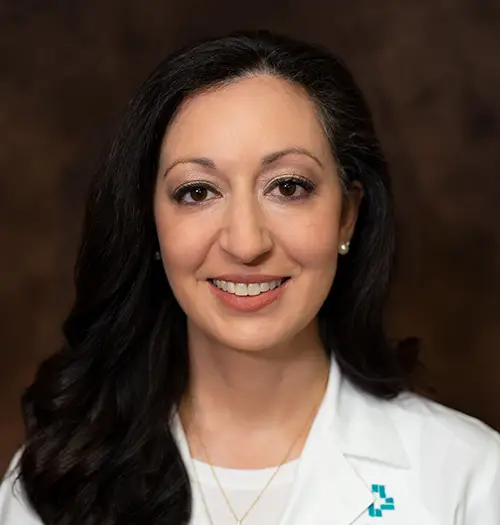How Maternal Fetal Medicine Keeps You and Your Baby Safe
Pregnancy is often described as a journey filled with anticipation and excitement. However, for some women, this journey can be fraught with complications and uncertainties, classifying their pregnancy as high-risk. A high-risk pregnancy is one in which the mother, her fetus or both are more likely to have health problems during pregnancy or labor than in a typical pregnancy. Women whose pregnancies are considered high-risk may need specialized care or treatment to have healthy pregnancies and deliveries. This is where a maternal fetal medicine specialist steps in. A maternal fetal medicine doctor, also known as a perinatologist, is an obstetrician who has undergone additional training in high-risk pregnancies and fetal conditions.
Marie M. Darby, MD, a perinatologist with Hattiesburg Clinic Maternal Fetal Medicine, helps pregnant women monitor risks and manage any complications that arise. “Dealing with a high-risk pregnancy can cause a lot of fear and uncertainty,” Dr. Darby said. “We are committed to offering the care, support, resources and intervention needed to keep mom and baby safe.”
High-Risk Pregnancy Risk Factors
Many factors can contribute to a pregnancy being classified as high-risk including pre-existing or genetic conditions, maternal age, lifestyle factors, pregnancy-related issues and previous pregnancy complications. A maternal fetal medicine doctor will assess these risks and develop personalized care plans tailored to the specific needs of the mother and baby. These plans often involve collaboration with other health care providers, including primary obstetricians, neonatologists and other specialists. This comprehensive approach ensures that all potential risks are monitored and managed effectively.
Diabetes and Pregnancy
According to the Centers for Disease Control and Prevention (CDC), diabetes during pregnancy has increased in recent years. Diabetes in pregnancy can be classified into two main types: pregestational diabetes (existing Type 1 or Type 2 diabetes) and gestational diabetes, which develops during pregnancy. While many women with diabetes have healthy babies, there are risks associated with the disease that may deem the pregnancy as high-risk. The risks associated with diabetes during pregnancy rise with increasing blood glucose levels. Diabetes affects insulin, which moves glucose from the blood and into the body’s cells where it can be used for energy. If the insulin is not managed properly, glucose levels can rise and lead to birth defects, large birth weight and an increased risk of cesarean delivery.
“Managing diabetes during pregnancy requires dedication, careful planning and regular health care support,” Darby said. “Our team will help you closely monitor your blood sugar, adjust your lifestyle and maintain a balanced diet so you can have a healthy pregnancy and a healthy baby.”
Pregnancy After 35
The CDC states that the number of expectant mothers in their forties has continued to increase in the last three decades. It is advised that women over the age of 35 seek care from a specialist if they are pregnant or planning to become pregnant. These women are at increased risk of preterm labor and preterm birth, potentially causing the baby short-term and long-term health problems. Additionally, women who are in their thirties are more likely to need a cesarean delivery than women who are in their twenties. They are also more likely to have a baby affected by a genetic disorder. However, with proper planning, health care and support, women can have healthy pregnancies and enjoy the experience of parenthood later in life. It is essential to consult health care providers to create a personalized plan that addresses individual health needs and maximizes the chances of a positive pregnancy outcome.
“Whether you’re considering starting a family or expanding it later in life, it’s crucial to stay informed and proactive about your health to ensure the best possible outcome for you and your baby,” Darby said.
High Blood Pressure and Pregnancy
High blood pressure, or hypertension, is a significant health concern during pregnancy that can affect both the mother and the developing fetus. It can be pre-existing or develop during pregnancy. During pregnancy, elevated blood pressure can cause problems because it can disrupt normal blood flow to the fetus and can slow the growth of the baby. Women with hypertension during pregnancy are at greater risk of delivering prematurely, having a low-birthweight baby, having a stroke or developing heart disease, diabetes or high cholesterol. The risk of a condition called preeclampsia also increases with hypertension. Preeclampsia is a serious disorder that can affect all organs in your body and often develops in the third trimester. If untreated, preeclampsia can lead to heart disease, seizures, strokes and other serious complications.
High blood pressure during pregnancy requires careful management to minimize risks to both mother and baby. Through early detection, regular monitoring and appropriate treatment, many of the complications associated with hypertension can be managed effectively, leading to healthy outcomes. “We measure blood pressure at every prenatal appointment,” Darby said. “Early detection helps to establish an effective treatment plan, so the pregnancy and birth have the best possible outcome.”
Multiple Births
Pregnancy with multiples, also known as multifetal pregnancy, occurs when a woman is carrying more than one fetus simultaneously. This can result in the birth of twins, triplets or higher-order multiples (more than three). Twins and triplets are likely to occur naturally due to genetics, maternal age or previous pregnancies. Higher-order multiples are most commonly seen with infertility treatments. Multiple pregnancies are discovered during routine ultrasounds and are considered high risk because they increase the likelihood of complications such as preterm labor, gestational diabetes and preeclampsia. Most multiples are born prematurely and at a lower birth weight than a typical baby. Specialized care from a perinatologist can reduce the chances of these conditions occurring and early interventions can be recommended for treatment if needed.
“Discovering that you’re pregnant is an extraordinary moment, but finding out you’re carrying multiples can be overwhelming,” Darby said. “Our team is here to be your support system as you navigate the emotions and anxiety of a multiple pregnancy.”
Managing High Risk Pregnancies
Early and consistent prenatal care is crucial in identifying and managing high-risk pregnancies to improve outcomes for both mother and baby. A maternal fetal medicine specialist significantly improves the outcomes of high-risk pregnancies. Studies have shown that their expertise reduces the incidence of preterm births, low birthweights and other complications. By providing specialized care, they help ensure healthier pregnancies and deliveries, giving both mother and baby the best possible start. While every pregnancy is different, common care provided by a perinatologist can include:
- Preconception Counseling: Women with pre-existing or genetic conditions should seek preconception counseling to optimize health before becoming pregnant.
- Regular Monitoring: Frequent prenatal visits, advanced ultrasounds and other diagnostic tests help monitor the health of the mother and fetus and identify potential issues.
- Medication Management: Adjusting medications to those that are safer during pregnancy while maintaining control of the underlying condition is critical.
- Lifestyle Modifications: Diet, exercise and stress management can play a significant role in managing pre-existing conditions during pregnancy.
- Delivery Planning: High-risk pregnancies often require careful planning for delivery, including choosing the appropriate time and method of delivery to minimize risks for both mother and baby.
Why Choose Hattiesburg Clinic?
The maternal fetal medicine team at Hattiesburg Clinic understands how stressful it can be to go through a high-risk pregnancy. Our perinatology expert has the knowledge and experience to support mothers through this journey. She received years of special training in the assessment and management of high-risk pregnancies. With a perinatologist, obstetricians, sonographers and obstetrical nurses, our comprehensive team offers the testing, treatment and monitoring you need to keep you and your baby safe. When complications occur during a pregnancy, you can be assured that you are in good hands at Hattiesburg Clinic.
For more information about maternal fetal medicine services offered at Hattiesburg Clinic, please call (601) 268-5640 or visit www.hattiesburgclinic.com/maternal-fetal-medicine.

